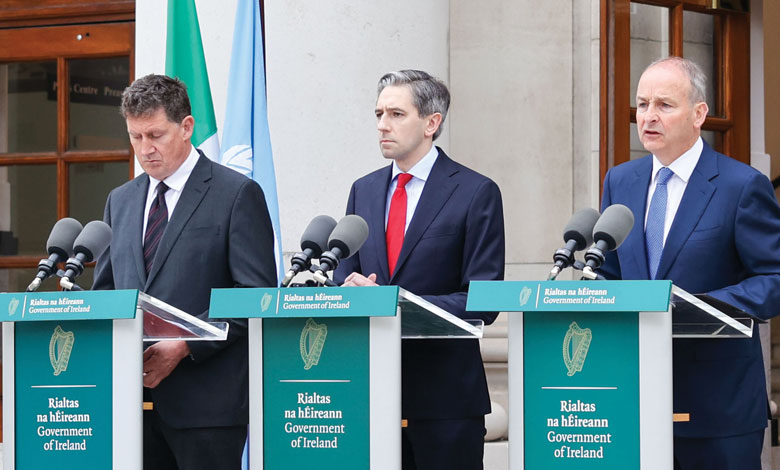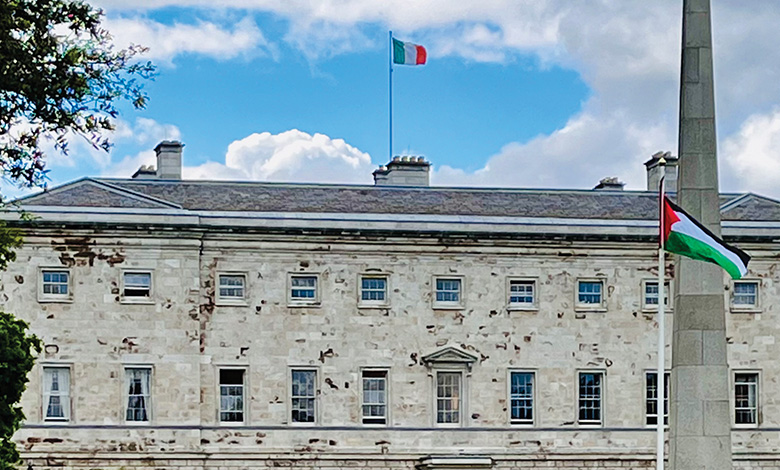Ireland recognises the State of Palestine

On 28 May 2024, in light of the ongoing Israeli invasion of Gaza, Ireland formally recognised the State of Palestine – 10 years after motions were passed in both Houses of the Oireachtas calling for recognition.
On 22 May 2024, 44 years after becoming the first EEC/EU member state to adopt a two-state solution foreign policy, Ireland alongside Norway and Spain announced its plan to recognise Palestine effective from 28 May. After “months of consultation with like-minded countries across Europe and the Middle East”, Taoiseach Simon Harris TD, Tánaiste Micheál Martin TD, and Minister Eamon Ryan TD – flanked by the national flag of Ireland and the flag of the UN rather than that of the EU – made the announcement at Government Buildings, Dublin.
Committing to “undertake whatever national steps are necessary to give effect to that [recognition]”, Harris asserted: “In the lead up to today’s announcement, I have spoken to a number of other leaders, and I am confident that further countries will join us in taking this important step in the coming weeks. This is an historic and an important day for Ireland and for Palestine.”
Ireland, Spain, and Norway now join the 142 other United Nations member states which already recognise the State of Palestine.
Describing recognition as “an act of powerful political and symbolic value”, Harris said: “Our step today, taken with Norway and Spain, is further recognition of the legitimate right to statehood. It is a statement of unequivocal support for a two-state solution – the only credible path to peace and security for Israel, for Palestine, and for their peoples… We take it to offer hope and encouragement to the people of Palestine in one of their darkest hours.”
That evening, the Taoiseach spoke with President of the State of Palestine, Mahmoud Abbas, and articulated to him that he was recognising Palestine, on behalf of the people of Ireland, “to keep the hopes of a two-state peace solution between Israel and Palestine alive”.
The Palestinian Ministry of Foreign Affairs and Expatriates responded: “Recognising the State of Palestine is a victory for Palestinian rights and an important practical step towards protecting the two-state solution based on ending the Israeli occupation and embodying the Palestinian state with its capital in Jerusalem.”
In response to the announcements, Israeli Foreign Minister Israel Katz ordered the immediate return of the Israeli ambassador to Ireland, Dana Erlich, for consultations and warned of further unspecified “severe consequences”.

The Government’s recognition is of a State of Palestine on the ‘1967 borders’. However, this border recognition could be subject to change if a settlement is met in the Israel-Palestine conflict.
Context
In advance, the Taoiseach had spoken with the Prime Minister of Spain, Pedro Sánchez, on 6 May and the Prime Minister of Norway, Jonas Gahr Støre, on 18 May 2024.
Having discussed “the dire situation in the Middle East and particularly in Gaza” and “our ongoing work together on recognising the State of Palestine” with Sánchez, the Taoiseach observed: “We reaffirmed the wish for both Spain and Ireland to recognise Palestine, agreeing that formal recognition is an important part of acknowledging that a two-state solution is the only way to bring about peace and stability in the region.”
Similarly, the Taoiseach updated Støre on Ireland’s plan to imminently recognise the State of Palestine, as well as ongoing work with Sanchez of Spain. A government press release recorded: “The pair agreed that the deteriorating humanitarian conditions in Gaza underscored the need for an immediate ceasefire and for unhindered access for aid.”
In the intervening time, on 10 May, 143 out of 193 UN member states voted to determine that the State of Palestine is qualified for membership in the United Nations in accordance with the Charter of the UN.
Palestinian Ambassador
As a result of the State’s recognition of Palestine, the Mission of the State of Palestine in Dublin is now formally recognised as an embassy, and the Government has changed the classification of its office in Ramallah, Occupied West Bank, to that of an embassy.
Talking to eolas Magazine earlier in January 2024, the Palestinian Ambassador to Ireland, Jilan Wahba Abdalmajid, referenced the granting of non-member observer state status in the UN General Assembly. “Ireland recognised and voted in favour of recognition in 2012,” she highlighted, adding: “This is a reflection of the practical measures on the ground to recognise the State of Palestine.”
In response to a question posed on the significance of formal recognition, she referenced the European countries, such as Cyprus and Sweden, among the 139 UN member states (out of a total of 193) which have recognised Palestinian statehood and asserted: “We want recognition from the international community. We are a state. When we sit at the table, we want to be equal. We were given the recognition of this right in the UN in 1947 and we want to have it activated [under UN General Assembly Resolution 181 (II)].”

Practically, this recognition, she suggests, enables Palestine to engage and access UN and international agency funding, as well as placing it on an equal footing as its occupier under international law, for instance, as a state party of the Rome Statute of the International Criminal Court (ICC).
“We managed to access and be recognised within the jurisdiction of the ICC, and we are part of the International Court of Justice (ICJ),” Wahba Abdalmajid explained, adding: “There should be a legal limit on the occupation in Palestine. Since 1967, the occupation has violated every aspect of international law and every aspect of UN resolutions with impunity. We have to take this occupation to a different level of accountability. The status of being a state will help us in any future negotiation with Israel – to not be less than equal to the State of Israel.”
Opposition
On the formal recognition of Palestine, something previously flagged as a foreign policy priority by his party leader, Sinn Féin’s Foreign Affairs spokesperson, Matt Carthy TD told eolas Magazine in early October 2023 that a Sinn Féin government would seek to pursue it “as a matter of priority”. “I think it will be preferable, obviously, if we could do that in conjunction with other countries around the world,” he added.
Subsequently, Carthy welcomed the announcement of formal recognition and speaking in the Dáil he said: “I commend all those who have campaigned for this moment, all those who marched, who petitioned, who have stood up for international law, and for the reality that the only route to a lasting peace in the Middle East lies with a free, independent and sovereign Palestinian state…
“I expect that government will take the next logical steps. Israel must be held to account and meaningfully sanctioned for the ongoing gross violations of international law in Gaza and across Palestine.”
Similarly, Social Democrats leader Holly Cairns TD said: “The Irish people’s solidarity with the people of Palestine is unbreakable. It is long past time this solidarity was formally acknowledged by our government with recognition of the State of Palestine – my only regret is that it did not happen sooner…
“The Irish Government must now take the next step and enact diplomatic and economic sanctions against Israel.”
|
Historical context In a joint statement – which became known as the Bahrain Declaration – with the foreign minister of Bahrain, the late Brian Lenihan senior, as Ireland’s then-Minister for Foreign Affairs, asserted that the Palestinian “had a right to self-determination and to the establishment of an independent state in Palestine”, while also recognising “the role of the PLO [Palestinian Liberation Organization] in representing the Palestinian people”. However, while both Houses of the Oireachtas passed motions calling on the Fine Gael-Labour government to formally recognise the State of Palestine in late 2014, it took a decade for Ireland to recognise the State of Palestine. In March 2011, then-Minister for Foreign Affairs Eamon Gilmore responded to a Dáil question posed by Sinn Féin TD Pádraig Mac Lochlainn on Ireland’s proposed recognition of the State of Palestine insisting: “I share the commitment of successive Irish governments to this policy [the two-state solution] and will be working towards its realisation. It would be premature to declare such recognition now in advance of actual control of the territory in question, a condition to which we in Ireland attach great importance.” The implication was, therefore, that Ireland had been reserving its recognition of the State of Palestine until a time in which the Palestinian Authority has control of the entirety of its claimed territory – potentially as a component of a two-state solution deal. Meanwhile, as recently as December 2023, then-Taoiseach Leo Varadkar TD responded to Labour leader Ivana Bacik TD during Leaders’ Questions in the Dáil, saying: “We don’t believe that the best way to do it [recognise Palestinian statehood] is unilaterally. That will be dismissed. It will be ineffectual, and we will be seen as an outlier, acting unilaterally, at a European level. What we would like to do, is do it as part of a group of European countries. I think that will be a more significant statement.” |






